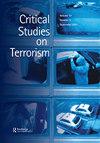Extremism: a philosophical analysis by Quassim Cassim: a review
IF 2.5
Q2 POLITICAL SCIENCE
引用次数: 1
Abstract
The first and most important thing that I would say is that I am extremely grateful to the conference organisers, and in particular Dr Rik Peels, for providing me with an opportunity to read the book and to provide some input on some of its topics. I was at once intrigued by the many ways in which different sorts of extremism are characterised in this book, and this continued throughout the book. Examples include the contrast between tactics extremism, ideological extremism, and psychological extremism as a valuable framework for working through ideas that are about the application, techniques, and mindsets concerning those that might interest us as extremists, among other things. These themes are explored in-depth, and the philosophical ramifications of the application in context are discussed for all who are interested in its meaning in practice – and, in some cases, what can be done to alleviate it in working through these conceptualisations. But what is interesting is how there are synergies between all the themes explored. In other words, extremism does not exist in a vacuum – and as argued by Cassam, we are talking about violent extremism here, rather than extremism in general – because not all extremism is violent. And what matters to us as social and philosophical thinkers, as well as those involved in policymaking, is how to deal with the most concerning form of extremism, which is extremism that poses a threat to our national security.《极端主义:卡西姆的哲学分析》述评
我想说的第一件也是最重要的一件事是,我非常感谢会议的组织者,特别是Rik Peels博士,他为我提供了阅读这本书的机会,并就其中的一些主题提供了一些意见。我立刻被这本书中不同类型的极端主义的特点所吸引,这贯穿了整本书。例子包括战术极端主义、意识形态极端主义和心理极端主义之间的对比,作为一个有价值的框架,用于研究关于应用、技术和心态的想法,这些想法可能会引起我们作为极端分子的兴趣,以及其他事情。这些主题进行了深入的探讨,并为所有对其在实践中的意义感兴趣的人讨论了应用程序在上下文中的哲学分支-在某些情况下,可以通过这些概念化来减轻它。但有趣的是,所有探索的主题之间如何产生协同效应。换句话说,极端主义并不存在于真空中——正如卡萨姆所说,我们在这里谈论的是暴力极端主义,而不是一般的极端主义——因为并非所有的极端主义都是暴力的。对我们这些社会和哲学思想家以及参与决策的人来说,最重要的是如何应对最令人担忧的极端主义形式,即对我们国家安全构成威胁的极端主义。
本文章由计算机程序翻译,如有差异,请以英文原文为准。
求助全文
约1分钟内获得全文
求助全文

 求助内容:
求助内容: 应助结果提醒方式:
应助结果提醒方式:


